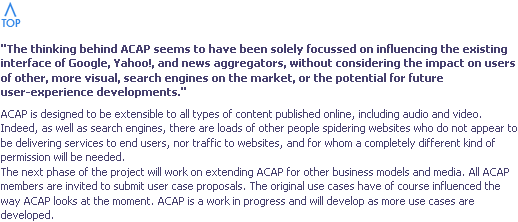FAQ you! ACAP doesn't do 'attribution' for critics
A couple of months back I wrote a post - ACAP - flawed and broken from the start? - about the launch of a new standard for controlling the indexing of web material by search engines. I wanted to pick up on it again for a couple of reasons.

The first is to point out that I have updated the original article with a correction. In the course of it I claimed that the ACAP file generation tools didn't work because of problems with the programming. The developer of the tool in question has left a comment on the original article this week.
Martin
> I was unaware that there was a 'known bug in Mozilla Firefox'
> that prevented it saving a text file as a text file
then check out:
https://bugzilla.mozilla.org/show_bug.cgi?id=300032
And MSIE is correct in warning that the file "may not save correctly" as it *itself* is adding the HTML page furniture.
What you're seeing is mainstream browser behaviour in the face of plain text sent with a "text/plain" MIME type, so I suggest you grumble instead about that, rather than the poor developer who wrote the perl script ...
[Full disclosure: I am that developer]
- Alex.
I've updated the article to reflect that comment, and emailed Alex to apologise about directing my ire at the developer.
However, whilst I take his points on board, I'm still happy to grumble about the business process that allowed the tool to go live on the site. The ACAP site hosts the tool and describes what it is supposed to do, when it was clearly known by the developer that it did not function properly in the two dominant browsers on the dominant OS platform. That still isn't terribly clever of them in my book.
The second point that brought ACAP back to my attention, and let's be honest, I haven't seen many publishers or search engines rushing to adopt it and keep it in the public eye, was that the group themselves have published an FAQ responding to their critics.
"Some of the critical commentary has been thoughtful and well informed and, where we have been able to, we have tried to answer comments directly. However, it has proved impossible to answer all criticism in this way because of time constraints. Because so many of our critics follow essentially the same lines of argument, we have tried to answer the most common criticisms in a single document. We doubt it will satisfy all our critics, but we hope that it shows that we take their comments seriously – and that these are not issues which we have simply not considered".
Credit where credit is due, it is good to at least see an attempt to engage with criticism, even if the tone is a little prickly. And they are quite right that it hasn't satisfied their critics - take this point:
"Content owners make substantial investments in the creation and distribution of books, films, newspapers, websites and countless other kinds of content, and they need to be able to make a fair return on those investments. Business models are changing, and publishers need a tool that is flexible and extensible as new business models arise".
Indeed, and I'm completely in accordance about publishers needing viable business models. It is just that the ACAP proposal seems a terribly retrograde step. At the very moment that the music industry has realised that equipping music files with DRM is an expensive and unpopular waste of their money, a group of publishers are trying to retro-fit what can only ever be an unenforceable voluntary code onto the established http:// protocol.
I would go on, but Ian Douglas at The Telegraph has so effectively skewered the majority of their argument that it is easier just to link to him. And he's a proper writer working for a proper publisher and everything, not just one of those inevitable critics from the blogosphere.
On a personal note, in the middle of the set of FAQs they state that:
One blogger wrote: "more 'stuff' will be published, precisely because you can do less with it."
Indeed, this one blogger did. I also wrote in my original piece:
"The thinking behind ACAP seems to have been solely focussed on influencing the existing interface of Google, Yahoo!, and news aggregators, without considering the impact on users of other, more visual, search engines on the market, or the potential for future user-experience developments."
This also appears on the page, verbatim, as one of ACAP's FAQs.

In the course of the response it is stated that 'the next phase of the project will work on extending ACAP'.
Perhaps one of the publishers in the consortium, who are the only people allowed to propose use cases for ACAP, could suggest they add some sort of 'Requires attribution' criteria, for the benefit of small publishers like me ;-)